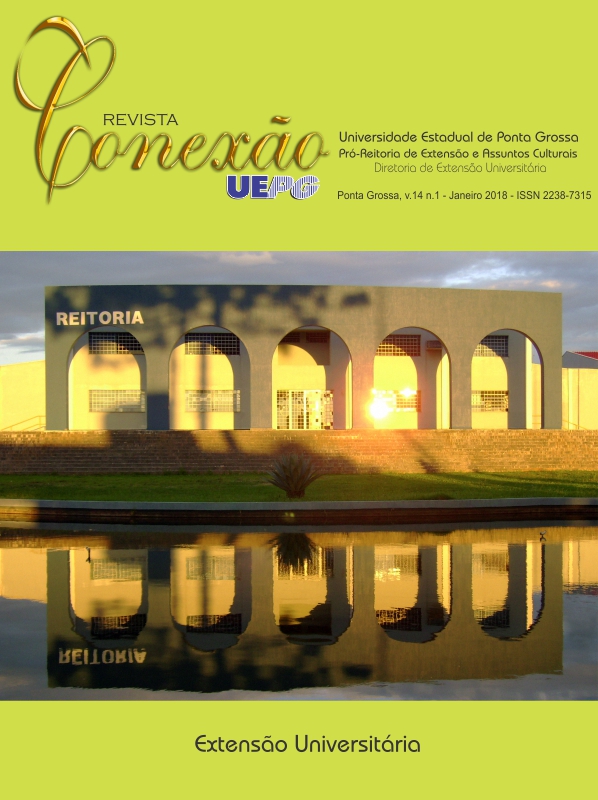YOUTH AND ADULT LITERACY: CHALLENGES AND POSSIBILITIES IN TEACHER EDUCATION
DOI:
https://doi.org/10.5212/Rev.Conexao.v.14.i1.0009Keywords:
youth and adults literacy, teacher education, pedagogical practices.Abstract
This study aims to present and analyze an outreach course offered to teachers from the Education of Youth and Adult Program in the scope of the “Current Challenges and Possibilities in Youth and Adult Literacy” from the University of the State of Rio de Janeiro (UERJ). This programme aims to invest in teachers´ continuous education. The methodology consisted in meetings with the teachers to discuss and reflect about themes concerning the challenges that emerge from their pedagogical practice, in order to think about the kind of school offered to these subjects. The theoretical reference is based on studies of authors such as Freire (1998; 2002), Arroyo (2006), Soares (2008) among others. The results demonstrate that continuous education of literacy teachers meets a current need as it enables to rethink pedagogical practices based on the dialogue with reality, on the specificity of the population and on their learning needs.
Downloads
References
ARROYO, Miguel G. Formar educadoras e educadores de jovens e adultos. In: SOARES, Leôncio. (Org.). Formação de Educadores de Jovens e Adultos. Belo Horizonte: Autêntica/Secad-Mec/Unesco, 2006.
DI PIERRO, Maria Clara. Notas sobre a redefinição da identidade e das políticas públicas de educação de jovens e adultos no Brasil. Educação e Sociedade. Campinas, v. 26, n. 92, out. 2005.
______; VÓVIO, Cláudia Lemos; ANDRADE, Eliane Ribeiro. Alfabetização de jovens e adultos no Brasil: lições da prática. Brasília: UNESCO, 2008.
FÁVERO, Osmar; RUMMERT, Sonia Maria; DE VARGAS, Sonia Maria. Formação de profissionais para a educação de jovens e adultos trabalhadores. Educação em Revista, Belo Horizonte, n. 30, dez. 1999.
FREIRE, Paulo. Pedagogia do Oprimido. 17.ed. Rio de Janeiro: Paz e Terra, 1987.
______. Pedagogia da autonomia: saberes necessários à prática educativa. 7.ed. São Paulo: Paz e Terra, 1998.
______. Professora sim, tia não: cartas a quem ousa ensinar. 2.ed. São Paulo: Olho d’Água, 2002.
HADDAD, Sérgio; DI PIERRO, Maria Clara. Escolarização de jovens e adultos. Revista Brasileira de Educação. São Paulo, n. 14, p. 108-130, mai./ago. 2000a.
______. ______. Aprendizagem de jovens e adultos: avaliação da década da educação para todos. São Paulo em Perspectiva, São Paulo, v.14, n.1, p. 29-40, mar., 2000b.
IBGE. Pesquisa Nacional por Amostra de Domicílios (PNAD) 2013. Disponível em: http://www.ibge.gov.br. Acesso em: 09 mai. 2016.
SOARES, Leôncio José Gomes. As políticas de EJA e as necessidades de aprendizagem dos jovens e adultos. In: RIBEIRO, Vera Masagão (Org.). Educação de jovens e adultos: novos leitores, novas leituras. Campinas, SP: Mercado de Letras: Associação de Leitura do Brasil – ALB; São Paulo: Ação Educativa, 2001.
______. Avanços e desafios na formação do educador de jovens e adultos. In: MACHADO, Maria Margarida (Org.). Formação de educadores de jovens e adultos. Brasília: Secad/MEC, Unesco, 2008.
SOARES, Magda. Letramento e alfabetização: as muitas facetas. Revista Brasileira de Educação, São Paulo, n. 25, 2004.
VÓVIO, Cláudia Lemos. Alfabetização de pessoas jovens e adultos: outras miradas, novos focos de atenção. In: SAMPAIO, Marisa Narciso; ALMEIDA, Rosilene Souza (Orgs.). Práticas de Educação de Jovens e Adultos: complexidades, desafios e propostas. Belo Horizonte: Autêntica, 2009.
ZANETTI, Maria Aparecida. Reflexões sobre a formação de educadores de jovens e adultos em redes de ensino públicas. In: MACHADO, Maria Margarida. (Org.). Formação de educadores de jovens e adultos. Brasília: Secad/MEC, Unesco, 2008.
Downloads
Published
Issue
Section
License
a) Authors retain copyright and grant the journal right of first publication with the work simultaneously licensed under a Creative Commons Attribution License that allows others to share the work with an acknowledgement of the work's authorship and initial publication in this journal.
b) By submitting an article to the Revista Conexão UEPG and having it approved, the authors agree to assign, without compensation, the following rights to the Journal: the rights of first publication and the rights to redistribute the article and its metadata to the indexing and reference services that the editors deem appropriate.
c) Readers are free to transfer, print out and use the articles published in the Journal, as long as there is always explicit mention to the author(s) and to the Revista Conexão UEPG and as long as there is no alteration of the original work. Any other use of the texts needs to be approved by the author(s) and by the Journal.






